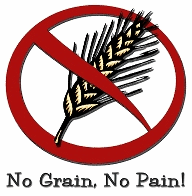
Are Grains Driving Your Pain?
Are Grains The Cause of Your Back Pain?
As a practitioner there is tremendous pressure to try and ‘fix’ people.
There is never any shortage of patients who roll up to the clinic with a bag full of health conditions they have accumulated over a life time of abuse, wanting someone to fix their problems (preferably with a tablet) so they can be on their way.
We have been marketed to over many years that this is how health care (Pharmacological care) really ‘should’ be. Unwittingly, and unnervingly, the wider population is being trained by endless ads over many years that this is reality.
This is not health care. It is not even sickness care.
It is merely priming the masses to move more product using practitioners as a window covering to give the illusion of credibility.
Fix My Back Doc!
In many respects, the big issue is always; how do we medicate you out of a condition you are eating yourself into?
Even worse is when it comes to Musculoskeletal pains.
How can I correct your spine out of a problem that is essentially driven and perpetuated by inflammatory changes in the body.
This is the huge disconnect.
How does my sandwich relate to my back pain? What has my donut go to do with my tendinitis? I am eating healthy – I go to Subway – what is your problem? I only eat ‘good healthy grains’.
‘After all I am here for you to fix my shoulder not talk to me about diet.’
Particularly when you are talking about things that no one wants to give up. Because in reality we all get addicted to grains.
So, if you are suffering from joint or muscular pain and aches – It is likely that your diet is not going to be the first place you look for answers, but maybe it should be.
Why?
Rheumatic (musculoskeletal) conditions such as osteoarthritis, rheumatoid arthritis and fibromyalgia are all driven by chronic inflammation, a process that is largely induced and sustained by poor dietary habits and depleted nutrient status.
Of course, other factors can be involved, such as abnormal mechanical wear and tear on joints which we address in the practice.
However it is clear that what we put in our mouths significantly impacts what we feel throughout our bodies.
The benefit of this knowledge is that patients with these conditions can have some control over their own disease and may be able to reduce or eliminate their need for toxic pain relieving drugs.
The Diet-Induced Pro-Inflammatory State
While different foods may trigger symptoms amongst different individuals, a common thread in most inflammatory conditions is excess intake of grains.
Refined grains in bread, cereals, pasta, pastries, etc. are the most problematic.
There are several mechanisms by which grains induce inflammation in the gut, which can then lead to body-wide inflammatory processes and pain, including:
Grains are Highly Pro-inflammatory
Once digested, grains reduce the pH of the body causing it to become more acidic and thereby increasing susceptibly to mineral deficiencies, chronic disease and inflammation.
That is why grains make you Osteoporotic.
You body will leach nearly all the calcium out of your bones in an effort to maintain the correct acid/alkaline balance. Indeed it will almost convert the bones of you hips, spine, knees etc. to mush in an effort to maintain correct pH.
Grains are also high in omega 6 fats which, when eaten in excess as they often are in the standard Western diet, throws out the omega 6:omega 3 fatty acid balance in the body.
As a result, there is an increase in the production of pro-inflammatory mediators and a reduction in anti-inflammatory mediators produced from omega 3 essential fatty acids (EFA), EPA and DHA.
This is why I consider the use of fish oils imperative in all Neuro-musculoskeletal patients.
All this is the real reason why people need to take so much of the fish oil.
Our diets are so pro-inflammatory we end up needing to take truck loads of fish oil to mitigate the inflammation.
But before you rush out an buy the cheapest oil you can find – you had better read the article on ‘Oils A’int Oils.
Allergenic Immune Response
Most grains contain a type of protein called gluten which can cause inflammation in the digestive tract and initiate abnormal immune responses in the body.
In extreme cases, this can lead to Celiac’s disease where gluten causes the destruction of the intestinal lining and can contribute to the development of other auto-immune conditions.
However, even mild sensitivities to gluten can have wide-ranging effects on the body – not just the gut – and can contribute to joint and muscle pain, fatigue, weight gain and many more health problems.
Where people make the mistake is that if they haven’t been given the ‘diagnosis’ of being a Celiac – they consider this a green light to eat as much of the stuff as they like.
Well unfortunately, that is completely incorrect.
Gluten is a problem. It is 10 to 15 times more reactive from an immunological point of view than it used to be.
Gluten is quite toxic and needs be avoided by everyone – whether you have been diagnosed as a Celiac or not. I will write some posts about this in the future.
Damaging Your Gut Lining
Increased gut permeability, a result of the gut inflammation is extremely common in sufferers of rheumatic disease and allows a number of harmful bacteria and toxic molecules to pass through the gut lining and into the blood stream.
This can further exacerbate abnormal immune responses, joint and body-wide inflammation, followed by pain.
Due to certain grain constituents such as lectins and gluten, grains have been found to be a major contributor to increased intestinal permeability, as are medications such as non-steroidal anti-inflammatories (NSAIDs) and antibiotics.
I have talked about ‘leaky gut’ or ‘Grain induced Dysbiosis’ for many years now.
I usually see it on a set of X-rays every week in the Clinic, when I am going through a new patient Report of Findings.
Damage Gut Bacteria Levels
Our intestinal bacteria play an essential role in immune regulation and digestive health.
In addition to increasing intestinal permeability, lectins, a type of protein found in cereal grains may encourage the overgrowth of inflammation-promoting gut bacteria. High carbohydrate diets such as those based on refined grains further exacerbate the overgrowth of opportunistic bacteria resulting in intestinal dysbiosis.
Interestingly, the severity of small intestinal bacterial overgrowth (SIBO) has also been found to be associated with the severity of pain experienced by fibromyalgia patients.
Cause Nutrient Depletions
Refined grains have little to no nutritional value in and of themselves.
In addition, deficiencies in essential nutrients such as zinc, iron, Vitamin D, B6, folate, Vitamin B12 and more are common in patients with poor digestive health, particularly those with undiagnosed wheat or gluten intolerance.
This may contribute to prolonged wound or soft tissue healing, fatigue, compromised antioxidant defences and other symptoms that commonly occur with chronic pain.
Grains are Addictive and Induce Weight Gain
Whether you like it or not, grains are highly addictive. They alter an array of neurotransmitters.
Grains, and in particular wheat generate opiate like peptides in the brain called exorphins, that basically instruct you to eat more food and increase calorie consumption.
This is why we use grains to fatten cattle. It works really well.
Patient who come of grains, on average drop their calorie intake to the tune of 300 to 400 calories per day. This is massive.
And will help you from becoming massive.
It is fairly obvious that the more weight you carry the greater the stress on your Musculoskeletal frame. Reduce or optimise your weight, you will obviously assist in your recovery.
What Your Doctor Wont Tell You
Current blood screening for gluten intolerance is limited due to the fact that only a few specific antibodies (immune complexes formed in response to gluten) are tested for. Wheat, the most commonly consumed grain contains a wide range of other proteins that may cause allergenic reactions and will not be detected.
Furthermore, some people may have mild grain intolerances that can still cause significant damage to the body, but do not cause a strong enough immune reaction to be picked up in current IgA blood tests.
This means many people with wheat, gluten and/or grain sensitivity are likely to remain undiagnosed.
How To Take Control Of Your Pain
Firstly, you will need to eliminate grains from your diet. If this sounds too daunting – commit to a grain-free diet for a month and see if you feel a difference before making it a permanent dietary change.
Simple and easy guidelines for following a grain-free diet can be found in our article here.
We also recommend comprehensive IgG food allergy testing to confirm wheat and grain sensitivities that may not show up in standard IgA allergy tests, and to determine if there are any other foods contributing to digestive damage and inflammation.
After making these important dietary changes, we recommend following this 3 Step ‘Grain Damage’ Recovery Guide:
Step 1. Repair Digestion
The first steps to repairing damage done to your gut (and body) by grains include restoring good bacteria levels and supporting immune function with a high-quality and potency probiotic supplement.
You can also reduce digestive inflammation and intestinal hyper-permeability with soothing nutritional and herbal formulas such as Intestamine.
Step 2. Reduce Inflammation
Anti-inflammatory herbal formulas containing turmeric extract (curcumin) are scientifically validated and safe for reducing pain and inflammation.
We recommend trying Curcuma Active (turmeric alone) or Boswellia Complex for a supplement containing turmeric with additional anti-inflammatory herbs such as Bowellia and Ginger.
Taking a pure and concentrated fish or krill oil supplement is also essential to help improve your Omega 3:6 ratio and thereby reduce inflammation. In addition, omega 3 fats have a lubricating action on joints to aid with arthritis management.
Step 3. Manage joint and muscle pain
As a Practitioner who is devoted to treating Neuro-Musculoskeletal problems I cannot over state the importance of taking Magnesium.
Magnesium is an essential nutrient for the relief of muscle tension, cramping and pain. It also has anti-inflammatory effects and may be particularly beneficial for people experiencing fatigue and nervous tension in addition to muscular symptoms.
To assist with joint repair and to slow the progression of arthritic joint degradation, we recommend taking a glucosamine and chondroitin containing formula such as ChondroCare Excel.
Did You Know?
If you have an inflamed gut or intestinal dysbiosis, you may not gain optimal benefits from glucosamine supplements, as glucosamine metabolism can be altered by gut bacteria and integrity thereby reducing the amount of glucosamine that reaches the joints.
This highlights the importance of repairing digestive health as part of an effective pain management plan.
Further Reading:
Gluten – Irritates the Gut, Drugs the Brain
Health Promoting Nutrition; Carbs and Proteins Explained
References
Rayman, M.P. et al. 2008, Dietary Manipulation in musculoskeletal conditions, Best Practice and Research, Clinical Rheumatology, Vol. 22(3)
Seaman, D.R. 2002, The Diet-Insuced Proinflammatory State: A Cause of Chronic Pain and Other Degenerative Diseases? Journal of Manipulative and Physiological Therapeutics. Vol. 25(3)
Taylor, M.E. 2011, Nutritional Support for Soft Tissue Healing, Journal of Prolotherapy, Vol. 3(3)





